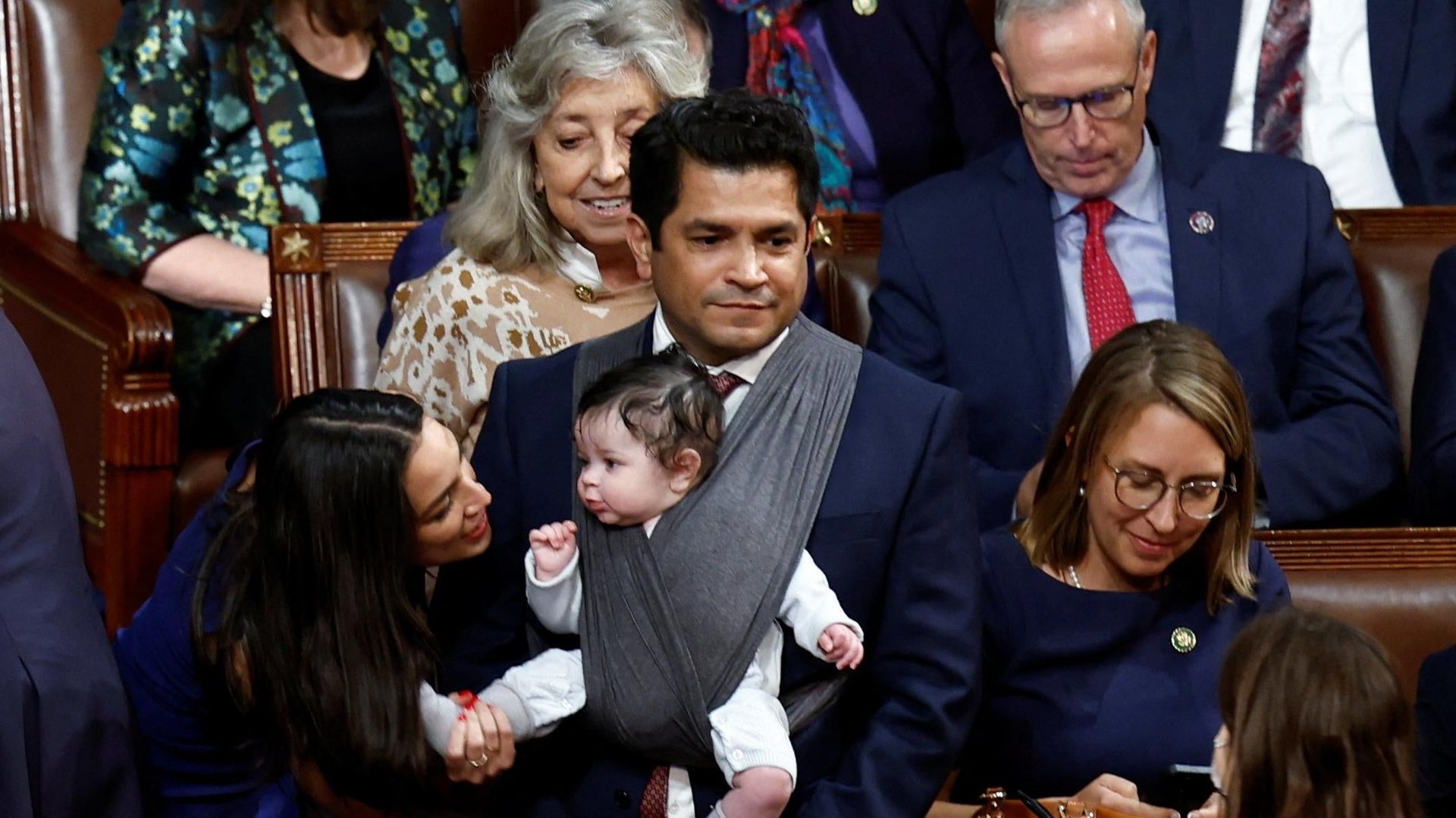There's a US Congressional dads caucus, and it wants more changing tables in restrooms
The move shows that fathers can play a key role in pushing for caregiving support at work

Even before pandemic lockdowns and a shift to remote and hybrid working, fathers reported wanting to be more involved in sharing childcare duties equally with their partners. But when it comes to the realities of that caregiving, facilities fall short for dads. Take diaper changing stations, which are still more readily found in women’s restrooms than in men’s.
Even the halls of US Congress have their shortcomings. On April 28, the Congressional Dads Caucus sent a letter to the US House Committee on House Administration, tasked with overseeing Congressional office buildings, asking for more baby-changing tables in its restrooms.
Thanks to a 2016 national law, both men’s and women’s restrooms are required to have baby-changing facilities in US federal buildings; a number of city and state laws also expand access in private buildings. But such laws don’t cover all buildings in the US—including Congressional office buildings, something the group seeks to rectify.
Whether or not more changing tables make their way into Congressional halls, the move is a welcome shift in who is pushing to support parents in the workplace. It also signals how men can take a more active stance in advocating for family-forward policies on the job, especially as women continue to shoulder a disproportionate share of caregiving.
Yes, there’s a caucus for dads in Congress—and it’s pushing policies for working families
The Congressional Dads Caucus aims to do just that. The group was formed earlier this year by representative Jimmy Gomez, a California Democrat who captured public attention when he wore his four-month-old son, Hodge, on the House floor during speaker elections. Gomez later said he hoped his son’s appearance “brought visibility to the role of working dads across the country.”
It’s worth wondering, too, why a father actively parenting on the House floor is newsworthy at all. “The praise I was getting for doing what any mother would do was out of proportion,” Gomez told the New York Times in February. “[I]f a woman did that, people would question her commitment to her job.”
The caucus now consists of 27 Democratic men, along with Congressional Mamas Caucus co-chair Rashida Tlaib. Changing tables are just a small part of the group’s advocacy. Its agenda also includes legislation like an expanded child tax credit, paid national family leave, and childcare program funding.
More men should lead family-friendly policies at work
Although a mothers’ caucus was formed in 2019, the one for dads has gotten its own unique boost of media coverage. Maybe that’s because pushes for policies that have families at their center sound novel coming from groups of men.
Historically, women—and especially mothers—have been the driving forces behind workplace policies that support families, such as affordable childcare, protections for pregnant workers, and paid parental leave. So when men lead their own advocacy for parental support, it signals a right-sizing of burdens that have long fallen largely on women.
Those burdens aren’t budging. According to a new global Deloitte report, nearly half of mothers who live with a partner say they handle the majority of childcare in their homes, while only 10% say that the majority falls to their partner. But when you ask men who’s contributing to unpaid work at home, you’ll find a sizable perception gap. While 70% of men in working couples say they do as many household chores as their female partners, only 42% of women agree.
Data from the Organisation for Economic Co-operation and Development (OECD) shows that each day, US women still average 4.5 hours of unpaid work, like caring for children; men, on the other hand, average just 2.8 hours. (That survey tallies overall averages, regardless of whether respondents are employed.)
That imbalance in unpaid labor has economic consequences that anybody should care about, whether they have a family or not. For one, there’s the motherhood penalty. In most countries, and especially wealthy ones, men’s and women’s salaries remain roughly the same until women enter their childbearing years.
But when women have children, their salaries and careers begin to drop behind those of their male counterparts—despite the fact that roughly as many men are having children, too. As Quartz’s Cassie Werber writes, that penalty is stalling the closing of the gender pay gap, along with marking a permanent decline in a woman’s earning power in the workplace. Studies suggest that even married women without children experience motherhood-related hiring bias in their careers.
That’s why it’s valuable to see fathers advocate for even small changes to accessible parenting, like facilities for diaper-changing in everyone’s offices. It’s well past due that men act as partners in that advocacy, especially if they’re already partners in parenthood. Fathers should be taking up the needs of families in the workplace, whether on the House floor or in office buildings, as a cause of their own—because it is.
